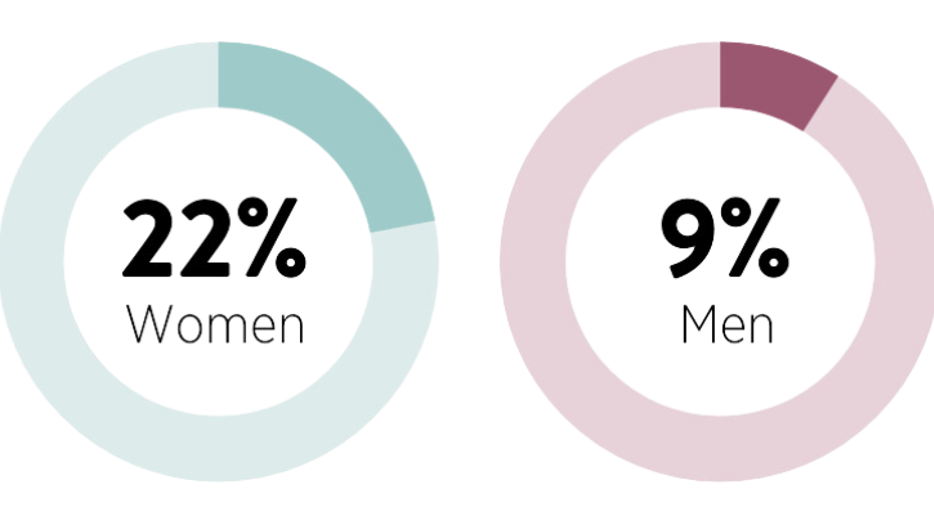Sub-goal 5: Equal health
There are differences in health between genders. Women's health is poorer than men's in several areas, including mental health. However, investments in women's health and maternity care have yielded positive results.

Women and men, girls and boys should have equal opportunities for good health and be offered care and support on equal terms.
Gender-equal health is a comprehensive goal that encompasses physical, mental, sexual, and reproductive health. The goal also includes preventive public health efforts, interventions for individuals within social services, support and services for people with disabilities, as well as healthcare and publicly-funded care.
The sub-goal of gender-equal health is closely related to other gender equality policy goals. Gender-equal health is both a prerequisite for and an outcome of equality in other areas. Economy, education, unpaid household and care work, as well as exposure to violence, are all factors that influence physical and mental health. Conversely, good health is a prerequisite for being able to educate oneself, financially support oneself, and contribute to unpaid household and care work.
Women report health problems more frequently than men
This includes mental health issues, which are increasing, most notably among girls and younger women. The connection between health and gender is clear, but factors such as age, disability, country of birth, income, and education also influence the health of women and men.
Women live longer but rate their health as poorer and have more years with reduced activity capacity compared to men. Men have a shorter life expectancy but rate their health as better and have fewer years with reduced activity capacity.
Despite life expectancy in Sweden continuing to increase for both women and men, there are groups that are not keeping up with this progress. Among low-educated women, life expectancy has not increased at the same rate as for others over the past 25 years. Therefore, raising the retirement age may negatively affect older low-educated women.
Women seek medical care more often than men
Women consume 20 percent more healthcare services than men, with a significant portion of this difference attributed to maternity and childbirth care. However, when reproductive and gender-specific care are excluded, the difference decreases to eight percent, explained by women seeking more care for mental health issues and musculoskeletal problems. Women more often seek care at primary care centers, while men have more hospital admissions, especially in older age groups.
Men are generally less accustomed to seeking medical care, take more risks, and have poorer lifestyle habits than women, which are considered explanatory factors behind men being more prone to accidents and dying earlier from several major diseases.
Gender norms play a role in health but can also influence the diagnosis and treatment women and men receive. Men less frequently seek care for mental health issues and undergo more physical examinations than women, whose health problems may be at risk of being perceived as psychosomatic.
Women and men experience impaired mental health, anxiety, and stress in different ways
Girls and women experience reduced mental health, anxiety, and stress to a greater extent than men and are diagnosed more often with anxiety and depression. Women are also overrepresented in sick leave due to mental health issues.
The reasons for stress-related sick leave in female-dominated industries are well documented and often stem from low control over the work situation combined with high job demands. Women also perform more unpaid household and caregiving work, leading to increased stress.

Despite women being diagnosed with mental health issues more frequently than men, significantly more men than women commit suicide. This suggests an underdiagnosis of mental health issues in men.
Positive results after investments in women's health and maternity care
Since 2015, the government has made significant investments in women's health and maternity care. The focus has been on care during pregnancy, childbirth, and postpartum care. Additionally, women-specific diseases and other conditions where women are overrepresented, which were previously neglected and underprioritised in healthcare, are included, such as:
- Endometriosis
- Provoked vulvodynia (formerly vestibulitis)
- Thyroid issues
- Menopausal symptoms
The investment also includes measures to increase screening for breast cancer and cervical cancer, as well as providing free contraceptives for young people under 21 years old. Part of the investment has involved allocating more resources to primary care interventions for women's health in socioeconomically disadvantaged areas.
The government's long-term investment has yielded results. The proportion of women experiencing serious childbirth injuries has decreased, and the proportion of women screened for alcohol misuse and exposure to violence upon enrolment in maternity care has reached set goals. More women attend postpartum check-ups, regardless of education level and background, and the proportion of women highly satisfied with their childbirth experience has increased. However, significant regional disparities still exist.
Despite the prioritisation of increasing staffing levels in maternity care, significant issues with workforce supply and staffing persist. In 2020, one in four trained midwives worked in a different capacity. This indicates that the work environment and conditions within maternity care are inadequate.
What is needed for a more gender-equal health?
Gender-equal health contributes to more women and men, girls and boys, being able to actively participate in society. The differences in health between genders and the increasing health gaps linked to inequalities within the population are a challenge.
The Swedish Gender Equality Agency highlights several areas for development:
- The need for a modernised social security protection for pregnant women.
- New mothers with childbirth injuries should have extended access to sick leave for enhanced opportunities for rehabilitation and recovery.
- Increased diagnosis and improved treatment of gender-specific conditions and diseases more common among women are needed.
- Continued implementation of the Sexual and Reproductive Health and Rights (SRHR) strategy with a focus on equality aspects.
- Clearer elements of gender equality, gender differences, and gender in healthcare education need to be introduced.
- Gender-specific differences in diagnosis, treatment, and research need to be taken into account regarding major public health issues such as cancer and cardiovascular disease.
- Increased knowledge and treatment strategies related to intimate partner violence, sexual violence, and honour-related violence and oppression are needed, including how such exposure is linked to ill-health and stress-related illness.
- Diagnosis and treatment of mental illness in men needs to increase.
- Increased understanding of how social media affects the mental (ill) health of girls and boys, as well as increased knowledge about mental health from a gender perspective, is needed.
- Improved work environment and working conditions are needed in female-dominated sectors such as healthcare, education, and social care.
Publication date: 7 January 2022
Last updated: 13 June 2024
